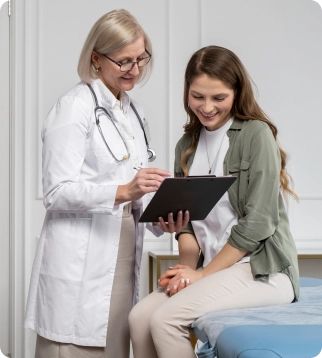Digestive problems can affect anyone. However, did you know women are more likely to experience certain digestive issues than men? Hormones, lifestyle, and even stress levels play a big role in how the digestive system functions. That’s why it’s important to understand the common problems and how to manage them. Let’s break down the most common digestive disorders in women and why they affect them.
1. Irritable Bowel Syndrome (IBS) is One of the Most Common Digestive Disorders
IBS is one of the most common digestive disorders in women. According to the International Foundation for Gastrointestinal Disorders, around 60–65% of people with IBS are female.
This condition causes bloating, cramping, gas, diarrhea, or constipation. For some women, symptoms get worse around their periods. That’s because hormones like estrogen and progesterone can affect how the gut works.
The good news? IBS doesn’t damage the intestines. With the right diet, stress management, and sometimes medication, symptoms can be controlled.

2. Acid Reflux and GERD are the Second Most Common Digestive Disorders
Everyone gets heartburn once in a while. However, when it happens often, it may be a sign of GERD (Gastroesophageal Reflux Disease). As a result, GERD causes stomach acid to flow back into the esophagus. This leads to burning in the chest or throat.
In women, symptoms may feel different. Instead of just heartburn, they may feel nausea, a dry cough, or chest tightness. Pregnancy, obesity, and certain foods can make GERD worse.
About 18–28% of adults in North America suffer from GERD, says the American College of Gastroenterology. To help this, lifestyle changes, like avoiding spicy food or eating smaller meals, can play a big role. In some cases, medicine is needed.
3. Gallstones
Gallstones are small stones that form in the gallbladder. According to the National Library of Medicine, women are twice as likely as men to get them, especially between the ages of 20 and 60. Hormones, birth control pills, and pregnancy can increase the risk.
Often, gallstones don’t cause symptoms. However, when they do, you may feel pain in the upper right side of the abdomen, especially after eating fatty food. In some cases, surgery is needed to remove the gallbladder.
4. Constipation
While constipation can affect anyone, women are more likely to experience it, especially during pregnancy, after childbirth, or as they age. Hormonal changes and slower digestion may be to blame.
Drinking more water, eating fiber-rich foods, and moving your body each day can help. If the problem continues, it’s best to talk to a doctor.
5. Bloating and Gas
Many women complain of feeling bloated, even if they haven’t eaten much. Bloating can be caused by diet, stress, or underlying issues like IBS or lactose intolerance.
Tracking what you eat, avoiding carbonated drinks, and cutting down on processed foods can reduce the problem. In some cases, probiotics may help balance gut bacteria.
Why Women Are More Susceptible to Common Digestive Disorders
Women’s bodies go through many hormonal shifts during menstruation, pregnancy, and menopause. As a result, these changes affect the way the digestive system functions. Also, women tend to report higher levels of stress and anxiety. This, in turn, can trigger digestive symptoms.
When to See a Doctor
Mild digestive symptoms are common. However, if you notice severe pain, bloody stools, unexplained weight loss, or symptoms that don’t go away, it’s time to see a doctor. Early diagnosis, as a result, leads to better outcomes.
Tips to Support Digestive Health
- Stay hydrated – Drink enough water every day
- Eat more fiber – Fruits, vegetables, and whole grains are great choices
- Get moving – Regular exercise helps digestion
- Limit trigger foods – Spicy, greasy, or processed foods can make symptoms worse
- Manage stress – Try yoga, meditation, or even short walks
Final Thoughts
Digestive health is a big part of overall well-being. While many women face digestive issues, understanding them makes it easier to take control. Small changes in your diet and routine can make a big difference.
If you’ve been dealing with stomach troubles, don’t ignore them. To understand your concerns better, talk to your doctor, ask questions, and stay informed. Your gut health matters.
Need Help? We’re Here for You.
At GI Partners of Illinois, we specialize in diagnosing and treating a wide range of digestive conditions that commonly affect women. Our team of expert gastroenterologists offers compassionate, personalized care to help you feel your best.
💬 Schedule an appointment today and take the first step toward better digestive health.
📞 Call us at (872) 328-4880 or visit www.gipartnersofi.com to learn more.
